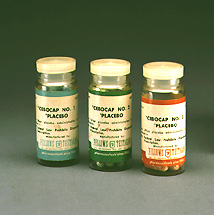One size does not fit all: Does the brain ‘remember’ antidepressants?
 Study offers more proof for the power of placebo, say UCLA researchers (UCLA press release):
Study offers more proof for the power of placebo, say UCLA researchers (UCLA press release):
— “While the relationship between prior treatment and the brain’s response to subsequent treatment is unknown, a new study by UCLA researchers suggests that how the brain responds to antidepressant medication may be influenced by its remembering of past antidepressant exposure.”
— “Subjects who had never been treated with an antidepressant exhibited large increases in prefrontal brain activity during placebo treatment. But those who had used antidepressant medication in the past showed slight decreases in prefrontal activity — brain changes that were indistinguishable from those produced by the actual drug.”
— “While medication can have a powerful effect on our physiology, said Hunter, “the behaviors and cues in the environment that are associated with taking medication can come to elicit their own effects. One’s personal treatment history is one of the many factors that influence the overall effects of treatment.”
Previous related article: Could studying the placebo effect change the way we think about medicine?
New study: Does prior antidepressant treatment of major depression impact brain function during current treatment? (European Neuropsychopharmacology)
Abstract: The relationship between prior antidepressant treatment and prefrontal brain functional response to subsequent treatment with antidepressant medication or placebo is unknown. Eighty-nine adults with Major Depressive Disorder (MDD), characterized as antidepressant-experienced or antidepressant-naive, received one week of single-blind placebo treatment prior to eight weeks of randomized treatment with medication (fluoxetine or venlafaxine; n=47) or placebo (n=42) in one of three similar placebo-controlled trials. Brain function was assessed at baseline, end of placebo lead-in, and during randomized treatment using quantitative electroencephalography (qEEG). The authors assessed change in prefrontal theta-band cordance (PFC) in antidepressant-experienced vs. antidepressant-naive subjects. Treatment history groups differed significantly on PFC change during the placebo lead-in even when controlling for clinical and demographic variables (F(1,62)=4.27, p=.04). As assessed in linear mixed models that examined treatment history (antidepressant-experienced or antidepressant-naive), treatment assignment (medication or placebo), and their interaction as predictors, treatment history also predicted PFC change during the randomized phase of treatment even when controlling for pretreatment clinical and demographic and symptom improvement during treatment (F(1,5o)=5.20, p=.03). The interaction was not significant. Post hoc analyses showed that antidepressant-experienced subjects treated with placebo showed PFC changes that did not differ from PFC changes seen in the medication group. Results suggest that prefrontal brain functional changes during treatment for MDD may differ depending upon prior treatment with antidepressant medication.


